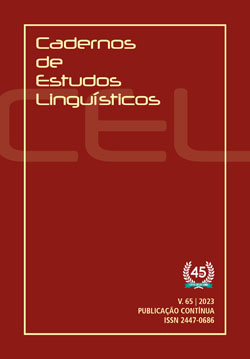Abstract
J is the title of one of the nine short films in ICEM's Marco Universal project. It is 13 minutes long and concerns a community leader of one of Rio de Janeiro's slums who denounces the militia and seeks police protection in various ways. The short film portrays the character's efforts and his outcome. This putting on stage is the central point of the formulation of the short film's discourse, which becomes the object of work analysis. Considering that “to formulate is to give body to the meanings” and that the formulation does not refer to the word itself, but to a process of discourse production, in which “language comes to life” and “memory is updated” (ORLANDI, 2001, p. 9), we seek to observe which meaning region is updated in/by the discourse of the short film in relation to the theme of human rights contiguous to J. Thus, this work is sustained under two prisms, a more theoretical one and the other is analytical. The first consists of proposing to position the short film as a piece of language and, as such, advocate its discursive process, shifting it from a place of empirical observation, whose focus could be given to its function, to analyze it as for its operation. And under the prism of analysis, this work tries to explore, through description in counterpoint with interpretation, the formulation of a visible inexorably linked to the sayable, as an instance of updating of the interdiscourse, that is, of a body of socio-historical traits, exterior, previous and elsewhere, which form memory (PÊCHEUX, 2011 [1966]). As a result, the discursive process of symbolic restitution of violence is observed.
References
ALENCAR, T. R. O discurso da telenovela sobre a diferença: corpo, sujeito e sentidos em Viver a Vida. Dissertação (mestrado) – Universidade Estadual de Campinas. Campinas, SP, [s.n], 2022.
BRETANHA, S.; ERNST, A. G. Contradição, discurso e resistência em análise de discurso: só há falha daquilo que causa. Cadernos de Estudos Linguísticos, Campinas, SP, v. 63, n. 00, p. e021020, 2021. DOI: 10.20396/cel.v63i00.8661734. Disponível em: https://periodicos.sbu.unicamp.br/ojs/index.php/cel/article/view/8661734. Acesso em: 5 dez. 2023.
COSTA, G. C. Sentidos de milícia: entre a lei e o crime. Campinas: Editora da Unicamp, 2014.
COSTA, G. C. Lascas de historicidade entre discursos, imagens e arquivos. In: AMORIM, M.; SALES, C. A. S. (Org.). Discursos em rede: teias de saberes. 1ed.Campinas: Pontes, 2022, v. 1, p. 59-78.
HABERT, A. B. J.: a escolha pela opacidade e as condições restritivas. Alceu, PUC/RJ, v. 10 - n.19, jul./dez., 2009, p. 48 a 60.
ORLANDI, E. P. Interpretação: autoria, leitura e efeitos do trabalho simbólico. Rio de Janeiro: Vozes, 1996.
ORLANDI, E. P. Análise de discurso: princípios e procedimentos. Campinas, SP: Pontes, 1999.
ORLANDI, E. P. Discurso e texto: formulação e circulação dos sentidos. Campinas, SP: Pontes, 2001.
PÊCHEUX, M. Leitura e memória: projeto de pesquisa. In: ORLANDI, E. P. (org.), Análise de Discurso: Michel Pêcheux – textos escolhidos por Eni Orlandi. Campinas, SP: Pontes, 2011 [1966], p. 141-150.
PÊCHEUX, M. O discurso: estrutura ou acontecimento. 3ª ed., Trad. Eni Orlandi. Campinas, SP: Pontes, 2002 [1983].
PÊCHEUX, M. Abertura do colóquio. In: CONEIN, B., COURTINE, J.-J., GADET, F. MARANDIN, J.-M. PÊCHEUX, M. (orgs.) Materialidades discursivas. Campinas, SP: Editora da Unicamp, 2016 [1981], pp. 23-29.
PÊCHEUX, M. Papel da memória. In: ACHARD, P. et al. Papel da memória. Campinas, SP: Pontes, 1999, p. 49-57.
PÊCHEUX, M. Delimitações, inversões, deslocamentos. Cadernos de estudos linguísticos, Campinas, v. 19, pp.7-24, jul./dez, 1990.
PÊCHEUX, M. Análise Automática do Discurso. Trad. Eni Puccinelli Orlandi e Greciely Cristina da Costa. Campinas: Pontes, 2019 [1969].
RODRIGUES, E. A.; AGUSTINI, C.; CASTELLO BRANCO, L. O luto como funcionamento de linguagem. Cadernos de Estudos Linguísticos, Campinas, SP, v. 63, n. 00, p. e021035, 2021. DOI: 10.20396/cel.v63i00.8665210. Disponível em: https://periodicos.sbu.unicamp.br/ojs/index.php/cel/article/view/8665210. Acesso em: 5 dez. 2023.
SALLES, J. M. A dificuldade do documentário. Encontro da Anpocs, 2004.
SILVA, T. D. Linguagem e sociedade contemporânea: escrita, arquivos e objetos simbólico. In: Projeto de Pesquisa. Universidade Estadual de Campinas. Campinas, SP, [s.n], 2019.

This work is licensed under a Creative Commons Attribution-NonCommercial 4.0 International License.
Copyright (c) 2023 Cadernos de Estudos Linguísticos


